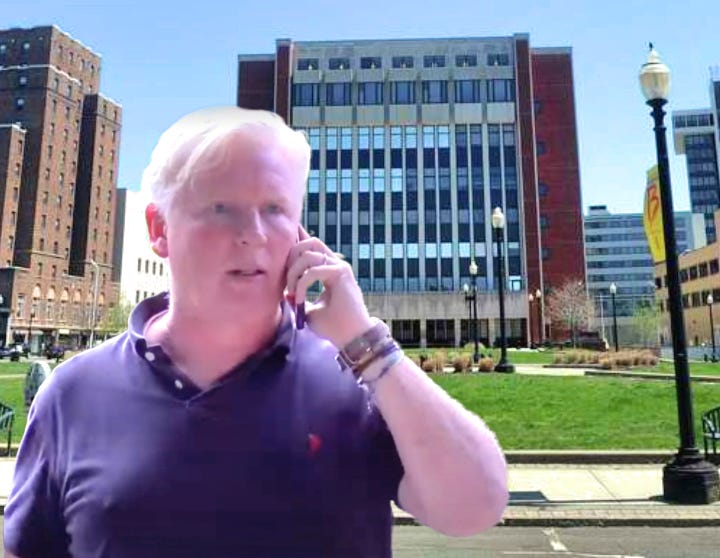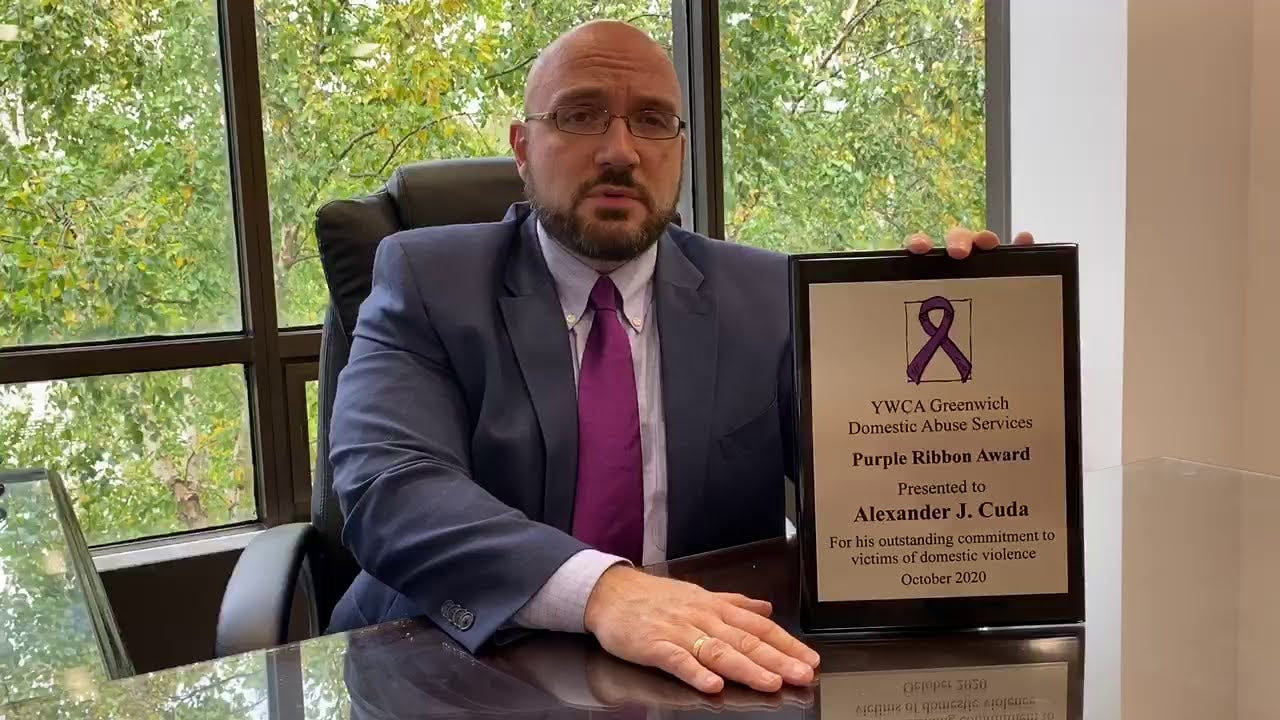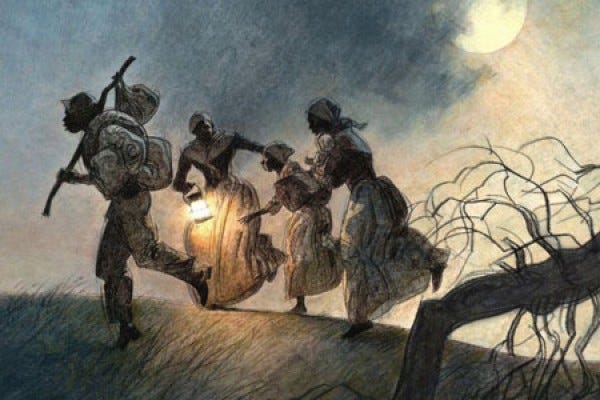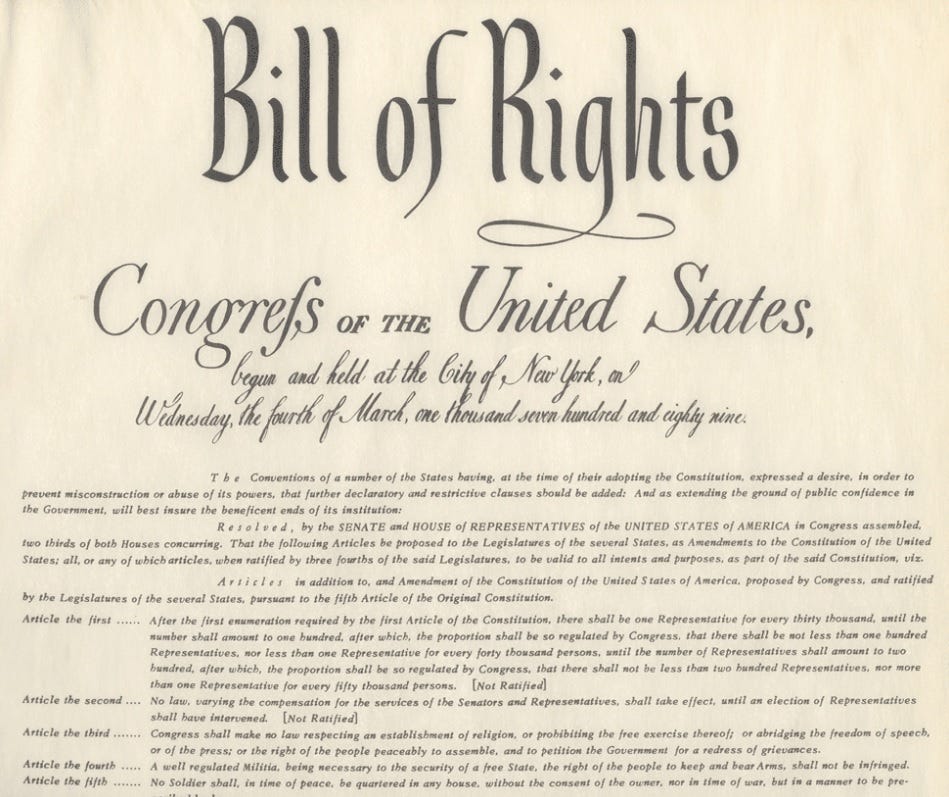Can the Ambrose Children Get Relief in Federal Court After Ruling Makes Them Homeless and Motherless?
CT Judge Thomas J. O'Neill's Decision Opens Door to Federal Questions Says Emergency Filing
NOTE: A Go Fund Me Page has been established to help Karen Riordan, a special education teacher, and her three children, Mia, Matthew, and Sawyer, reunite and achieve justice in her unequal fight against her well-funded ex-husband and a total psychopath, Christopher Ambrose. If it is within your means, please help this family.
DONATE HERE
Karen Riordan has complete discretion over the use of these funds, which will be used to:
Support the family in covering financial needs like food, clothing, and back-to-school. Ambrose hasn’t paid for his kids since April.
Hire experienced legal counsel to present a compelling case in court.
Engage qualified experts to evaluate the children’s well-being and provide unbiased assessments.
Highlight the evidence of abuse and its profound impact on the children’s mental and emotional health.
Advocate for the children’s voices to be heard and considered in court proceedings.
Promote regional and national awareness of this case so that abusers are not empowered by twisting Jennifer’s Law and similar legislation to protect domestic violence victims.
You can DONATE HERE. Regardless of size, every donation will significantly impact this family’s future. Your support can help reunite Mia, Matthew, and Sawyer with their mother, allowing them to heal and rebuild their lives.
DONATE HERE
By Richard Luthmann
Karen Riordan, mother of Mia, Matthew, and Sawyer Ambrose, filed an emergency motion in Connecticut Superior Court Thursday seeking relief from Restraining Orders rendering the teenagers homeless and forcing them to cross state lines to seek safe haven and refuge from an abusive father.
All three teenagers have filed petitions alleging abuse, including allegations of sexual penetration and improper sexual touching by their father Christopher Ambrose.
"Child Molester" and "Psychopath"
Recently, investigative journalist Richard Luthmann penned a letter to the Connecticut Family Court in Bridgeport, Connecticut, enclosing documents about disgraced Hollywood Writer Christopher Ambrose and evidence of abuse.
Connecticut Judge Thomas J. O’Neill issued the Restraining Orders on August 8. The mother, Riordan, was not present in court. She was in the hospital with her daughter, who was seeking treatment for emergency medical needs.

The adoptive father, Christopher Ambrose, a disgraced Hollywood writer, NYU Law grad, and suspended attorney, stood next to his high-priced Westport, CT, lawyer Alexander J. Cuda of the Needle Cuda law firm. At the same time, Judge O’Neill ruled that Karen Riordan could not see or contact her children for one year.
Will Christopher Ambrose's Abuse Cross State Lines?
Ashley Deckert, Director of the Rhode Island Division of Children, Youth, and Families is investigating the abuse claims of the Ambrose children, who have crossed state lines seeking safe haven from their abusive father.
The Ambrose teenagers are presently in Rhode Island with their grandfather and refuse to return to their father’s abusive custody.
The Emergency Filing
Riordan filed motions to articulate, reconsider, and vacate the August 8 Restraining Orders and an emergency motion to stay the enforcement of her one-year ban on seeing her children.
The papers ask the Court to clearly state why the Restraining Orders were issued in the first place. Ambrose petitioned Judge O’Neill flto explain his rulings, claiming Riordan, a 110-pound special education teacher, was a “domestic violence threat” to him and the teens.
Judge O’Neill, appointed to the bench by CT Governor Ned Lamont earlier this year, was most recently a corporate and commercial litigation partner at Day Pitney LLP, where he had a distinguished career representing some of the state’s most powerful corporate interests.
It appears, however, that the neophyte jurist has little Family Court Training.
Riordan claims Judge O’Neill’s ruling is illegal. The teenagers were not given a chance to address the Court or testify. Judge O’Neill would not consider written letters and statements from the teens.
Legal Maneuvers and Custodial Chaos
CT Family Court Judge Thomas J. O'Neill's recent ruling rendered the Ambrose teens, Mia, Matthew, and Sawyer, homeless and vulnerable after the Cout commanded their mother to stay away from them for one year.
None of the court-appointed attorneys for Mia, Matthew, or Sawyer was informed about the hearing, even though Ambrose appears to be legally adverse to his children.
Additional defects are alleged. Riordan says she could not present important medical evidence or properly subpoena witnesses.
She says the record is replete with “misinformation” and that Judge O’Neill did not follow the “law of the case,” a doctrine requiring judges to adhere to prior rulings or give clear reasons why they do not.
The emergency stay request is premised on many irreparable constitutional injuries, including Riordan’s privileges and immunities and the right to practice her profession. The pending Restraining Order disqualifies her from continuing her 25-year career as a special education teacher.
Riordan also claims constitutional rights to due process, liberty to parent, and petitioning the government and courts for redress were ignored.
An ideal result for Riordan would be for the CT Superior Court to stay the Restraining Orders while the case is reviewed, allowing her children to return home and her to return to work, with school beginning next week.
Ultimately, Riordan wants the Restraining Orders thrown out.
Judge O’Neill’s Ruling
Judge Thomas J. O’Neill issued no formal written decision. Instead, he made an oral ruling from the bench that Riordan wasn’t even present to hear.
The ruling issuing the Restraining Orders began by defining domestic violence:
Domestic violence includes coercive control of family members. It is defined as a pattern of behavior that is that, in purpose or effect, unreasonably interferes with a person's free will and personal liberty. This includes but is not limited to isolating the family member from friends, relatives, or other sources of support, depriving the family member of basic necessities, controlling, regulating, or monitoring the family member’s movements, communications, daily behavior, finances, economic resources, or access to services and comparing the family member by force threat or intimidation to engage in conduct from which the family member has a right to abstain or to abstain from conduct the family member has a right to pursue.
The branch of the law cited by Judge O’Neill is the recently enacted Jennifers’ Law, intended to give Connecticut courts the tools to confront the tell-tale signs of domestic violence after the murder-suicides of Jennifer Managano and Jennifer Dulos at the hands of their estranged husbands while family court proceedings were pending.

Judge O’Neill found that Karen Riordan had engaged in domestic violence under Jennifers’ Law’s recently-expanded definition. He said:
As soon as she obtained custody of the children, the same conduct, addressed and mentioned in a lengthy divorce trial, began again. The children started making the same allegations of similar allegations against Mr. Ambrose. Court filings have been made accusing him of abuse and other conduct. The minor children, allegedly on their own, sent and filed a letter in a New York legal action. The birth mother of the youngest son then shows up after many years to file a motion to intervene in the divorce action and files documents in New Haven Superior Court or juvenile court, one of the two.
The filings occurred, and the conduct of the children occurred around the same time that Ms. Riordan took custody of the children. The court finds the testimony of Mr. Ambrose more credible.
Judge O’Neill found that Karen Riordan was a domestic violence threat. The basis of his finding was that others - Mia, Matthew, Sawyer, and Sawyer’s birth mother - filed legal petitions with various courts and government agencies. At the same time, Karen had “custody” of the teenagers.
In making the domestic violence finding, Judge O’Neill issued three Restraining Orders (one for each teenager), ordering Karen to stay away from and not contact Mia, Matthew, and Sawyer. A violation would mean potential felony charges.
The result of the ruling and the Restraining Orders is that Karen Riordan’s rights are severely curtailed. For example, she cannot possess firearms. And more importantly, this special education teacher of 25 years can no longer practice her profession.

Through Attorney Cuda, Christopher Ambrose has already filed a contempt petition alleging Karen violated the Court’s Restraining Orders because Ambrose says he didn’t get his kids back.
The teens fled to Rhode Island. Ambrose says it’s Riordan’s fault, and she should be arrested for it.
Judge O’Neill is scheduled to hear the contempt motion on September 1.
Petitioning the Courts to Escape Christopher Ambrose’s Abuse
Karen Riordan says she never had custody of her children. Beginning in April, all three teens fled their father’s home for the safe haven of their mother.
After the teens left Christopher Ambrose’s home, they each filed petitions in Juvenile Court alleging abuse by him and him alone.
Ambrose called DCF and the Madison, CT Police, who performed wellness checks. Every time, the teens said they wanted to remain with their mother.
The teens were engaging in activities that the Bill of Rights protects. Specifically, they petitioned the government and the courts for help and redress.
Riordan’s papers say Judge O’Neill’s ruling raises a federal question of whether this protected activity can form the basis for a finding of domestic violence. Her papers say:
"[T]he right of access to the courts is an aspect of the First Amendment right to petition the Government for redress of grievances." Bill Johnson's Restaurants v. NLRB, 461 U.S. 731, 741, 103 S.Ct. 2161, 76 L.Ed.2d 277 (1983). The right to petition is "one of the most precious of the liberties safeguarded by the Bill of Rights." BE & K Constr. Co. v. NLRB, 536 U.S. 516, 524, 122 S.Ct. 2390, 153 L.Ed.2d 499 (2002).”
Riordan says the Court improperly punished her because her teenagers fled their father’s custody for safe haven. The papers say:
“Part of the safe haven sought was the rule of law and government protection. Each of them filed petitions alleging abuse. Each of the petitions is being entertained by the Superior Court, which has appointed lawyers for each of the teenagers, none of whom were noticed about the hearing in this case.
The teenagers were never under her custody and never coerced, Riordan’s papers say:
“I never took custody of the teenagers, as they were always free to return to their father, as is clear from the numerous police interactions precipitated by Christopher Ambrose’s wellness checks. Mia, Matthew, and Sawyer used the courts to stop Christopher Ambrose’s documented abuse, sexual and otherwise. The teenagers spoke with governmental actors they believed they could trust: police officers, school counselors, and ICAPS social workers. The teenagers also had counsel appointed on their behalf with whom they could speak freely and who could protect their legal interests. The teenagers seek to ask the Judges of the Superior Court for help and relief, which is their right.
Riordan says Judge O’Neill made a grave error. She claims he cannot use the exercise of a protected right, in this case exercised by others, as a reason to rule against her.
She points out that court-appointed Juvenile Court attorneys have already objected to Ambrose’s motions to dismiss and strike the teenagers’ allegations of abuse. The lawyers have resubmitted and updated the petitions against Ambrose, giving validity to each of the teens’ independent claims of abuse and neglect.
Mia, Matthew, and Sawyer’s separate petitions all allege excess drinking, drug use, and reckless endangerment, among other abuses, all occurring in Christopher Ambrose’s Madison, CT home.
Riordan wants Judge O’Neill to stay the enforcement of the Restraining Orders because of the constitutional questions raised. Her papers say:
The Court has not articulated how the exercise of this particular protected right amounts to domestic violence. I bring this motion to allow the Court to do so. I also occasion the Court to reconsider its decision and stay or rescind and vacate the Orders for these reasons.
Appeals and Federal Questions
Karen Riordan’s filed papers have allowed Judge O’Neill to articulate the legal and factual basis for his rulings. The judge will also be able to reconsider and possibly vacate his ruling.
We spoke with an attorney who practices family law in Connecticut who did not want his name disclosed because he knows many of the individuals related to the Ambrose v. Riordan matter.
“Riordan is asking the Court to take another look at the August 8 decision. It is clear that if she does not receive relief from Judge O’Neill, she intends to appeal. Part of her motion is for the Court to articulate why it ruled the way it did. This type of motion is usually made to create a record for a reviewing appeals court,” he said.
The lawyer said that Riordan’s case was interesting because she had several options at this juncture, all depending upon how Judge O’Neill treats the emergency motion.
“If Riordan is unhappy with Judge O’Neill’s consideration of her [emergency] motion, she can take it up with the appeals court. She can ask them for the same emergency relief,” he said.
The attorney said Karen Riordan’s case was unique because she also had the option to go to federal court based on “federal question jurisdiction.”
“Karen Riordan has raised several important issues that implicate the federal constitution. She may seek to file a petition in the Connecticut Federal Court and remove this case for determination of those issues,” he said.
The lawyer said these types of petitions are not often successful in family law matters but that Riordan still has the option.
“The federal court will entertain a petition that alleges a federal question or a constitutional violation. The case will stop in state superior court, and the matter will be heard in federal court. If it becomes clear that no federal question exists, the matter will be remanded back to superior court,” the attorney said.
Attorney and Activist Outcry
We spoke with a Harvard-educated lawyer, activist, and domestic violence/sexual assault advocate intimately familiar with the Connecticut courts, who agreed to speak upon conditions of anonymity for fear of retaliation.
“Whenever vulnerable populations are forced to cross state lines, there is a serious problem, often requiring a constitutional remedy. Many believe that such activity was limited to our country’s dark history of slavery pre-abolition. But it’s not. It happens every day with vulnerable populations, most often women and children, who are powerless and at risk,” she said.
“These teens fled an unjust ruling for safety from their abuser under cover of darkness. We are also seeing teens crossing state lines in the context of reproductive rights post-Dobbs,” referring to the recent US Supreme Court opinion overturning Roe. v. Wade.
The activist further claims that race, wealth, and power dynamics cannot be ignored.

“It should not be lost that the three teenagers are Hispanic, and their adoptive father is a white, wealthy, and well-connected member of the Connecticut elite class. Race, wealth, and power biases are an institutional problem in the Connecticut Family Courts,” the attorney-activist said.
One solution to these power imbalances, the advocate says, is the appointment of counsel to vulnerable persons in appropriate cases, also known as “Civil Gideon,” referring to the landmark U.S. Supreme Court decision requiring appointed counsel in criminal cases.
“If you don’t have counsel, you don’t have equal justice, and you don’t have due process. You don’t have justice at all. You have a ‘legal’ system but not a ‘justice’ system,” she said.
The lawyer and advocate also echoed concerns about the “twisting” of Jennifers’ Law, raised by Riordan in her papers.
“Jennifers’ Law was never intended to be applied in this manner, and it appears it was wrongly applied. The father’s ‘representative’ capacity in seeking Restraining Orders on behalf of the teens is adverse to the position of the teens in previously filed documents in Juvenile Court. Judge O’Neill even recognized these other proceedings on the record,” she said.
The attorney and activist had nothing nice to say about Christopher Ambrose’s lawyers in the case.
“It is beyond me how someone who purports to protect the victims of domestic violence could sign their name to this petition. If this ruling stands, the class of persons the Connecticut Legislature intended to protect will be the ones most at risk.”
What’s Next?
A call to the Clerk’s Office at Bridgeport Superior Court late Friday afternoon informed that Judge O’Neill had received the filed Emergency Motion but that no decision had been made.
Stay tuned for continuing coverage.
Richard Luthmann is a writer, commentator, satirist, and investigative journalist with degrees from Columbia University and the University of Miami. Once a fixture in New York City and State politics, Luthmann is a recovering attorney who lives in Southwest Florida and a proud member of the National Writers Union.
Check him out on Muck Rack.
“I am a journalist who writes about justice, the courts, government officials, prisons, and reform. You find some questionable players in all these places and often outright crooks. Exposing these bottom feeders from the outside is sometimes the only way to make them pay the price for their injustice and misdeeds.”
“I use satire and opinion to make my point. I have already been told to ‘stop writing about the Government’ by the U.S. Government, so I must be doing something right.”
“If you’re a victim of the system, maybe the press is the right forum for you. If you have experienced injustice and are tired of dropping tens of thousands of dollars without results, maybe it’s time to try the digital pen.”
Contact Richard Luthmann at 239-631-5957 or richard.luthmann@protonmail.com.
"Nihil est incertius vulgo, nihil obscurius voluntate hominum, nihil fallacius ratione tota comitiorum.” (Nothing is more unpredictable than the mob, more obscure than public opinion, and more deceptive than the whole political system.)
~ Marcus Tullius Cicero
The news media is a critical check on the powerful, serving as a watchdog to hold elected officials and other public figures accountable for their actions. The media was first called the Fourth Estate in 1821 by Edmund Burke, who wanted to point out the power of the press. The press plays a crucial role in providing citizens with access to information about what is happening in government and by shining a light on corruption, abuse of power, and other forms of wrongdoing.
















